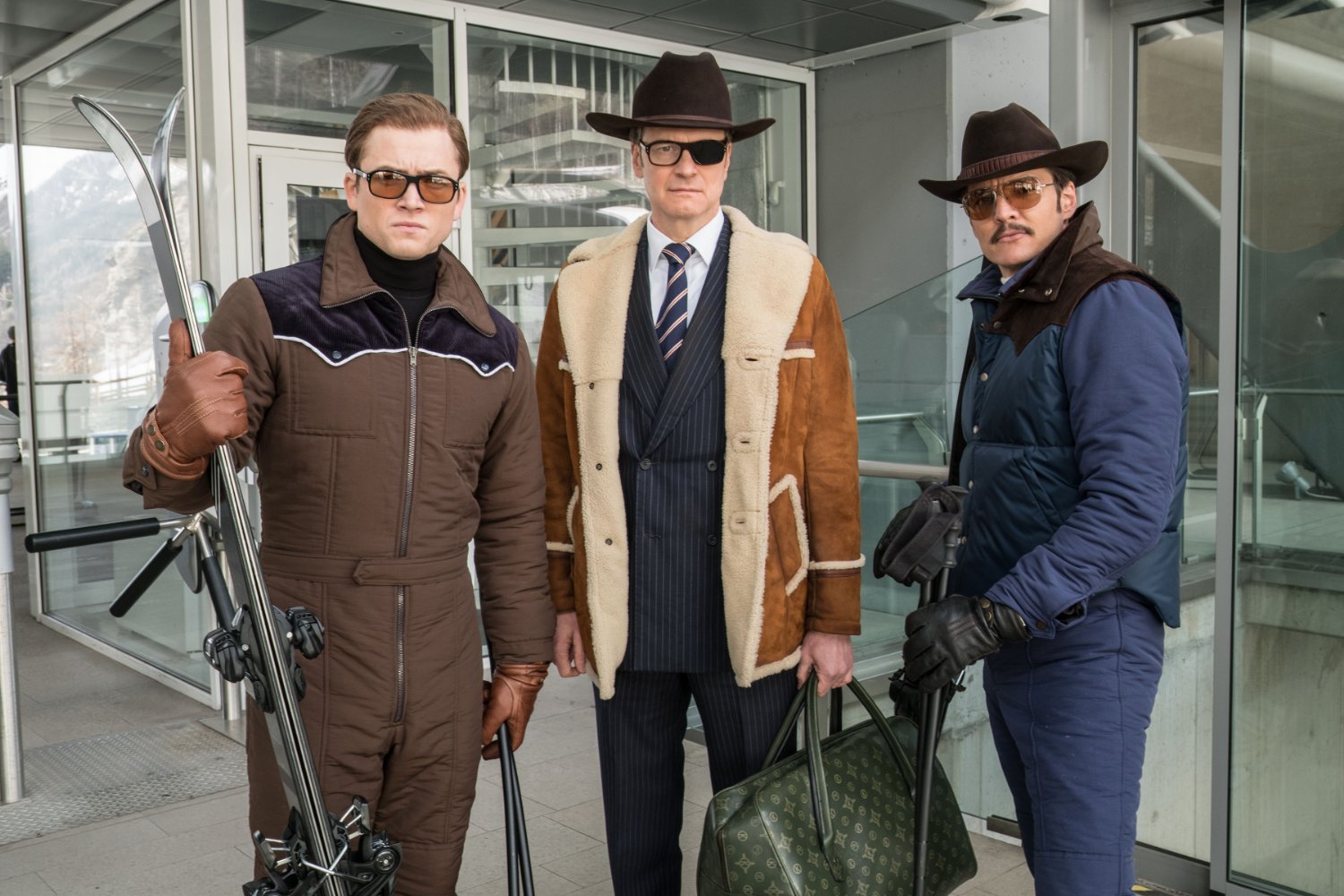Few films are made with as little restraint as Kingsman: The Golden Circle. Writer and director Matthew Vaughn manages to squeeze jaw-dropping action, political commentary, Elton John, betrayals, relationship drama, an over-the-top villain, sacrifices, and a massive cast into two hours and twenty minutes. The result is a film that feels so overstuffed that it’s a testament to Vaughn’s skill as a director that it doesn’t totally collapse under its own weight. Indeed, Kingsman: The Golden Circle is an undoubtedly zany and extremely enjoyable time at the movies, even if the sheer quantity of content in the film ends up being more exhausting than exhilarating.
The film picks up where its predecessor, 2014’s Kingsman: The Secret Service, left off. Taron Egerton plays Eggsy, who has adopted the codename “Galahad” previously held by his deceased mentor, played by Colin Firth. (Don’t worry, Firth comes back from the dead because apparently nothing was left on the cutting room floor.) The viewer is quickly thrust into a car chase barely two minutes into the film, and the action is undeniably awesome. Vaughn directs with a kinetic energy that is practically palpable, and he seamlessly mixes practical stunts in with CGI effects. Once the plot of the film gets underway in earnest, though, the flaws begin to show.
There’s simply too much of everything in the movie. Juggling these different elements could have worked, except for the fact that bringing back Firth actually proves to be a narrative mistake. Mark Strong reprises his role from the first film and is joined by newcomers Jeff Bridges, Channing Tatum, Halle Berry, and Pedro Pascal. Julianne Moore’s villainous Poppy chews every inch of scenery in sight, and in case that wasn’t enough, a cameo from the aforementioned Elton John puts the cherry on top of the extensive cast. The script adds another layer of complication by essentially recreating the mentor-mentee bond between Firth and Egerton that made the first Kingsman so great. The audience already knows and understands the relationship, yet the film still feels the need to go to great lengths to reunite the two characters and wastes time explaining how Firth returns instead of developing the new characters in any interesting way. The result is new characters that are shortchanged and old characters who tread familiar ground. For a film so obsessed with overkill, Kingsman feels strangely empty.
Now, this isn’t to say that the film doesn’t make these new characters memorable. Tatum, Bridges, Pascal, and Moore all feel like caricatures ripped straight out of a comic book, and their antics will have audiences in stitches. There are more laugh-out-loud moments here than in most new comedies, which fuels pacing that rarely skips a beat. The pacing is also helped by several eye-popping action scenes, which are all gorgeously shot. A particular highlight is a breathtaking stunt involving a ski lift that stretches the suspension of disbelief.
The story is a fairly paint-by-numbers affair involving Moore’s Poppy and her plan to distribute poisoned marijuana around the world. After many of the British Kingsmen are killed, Egerton and Strong travel across the pond to America, where they encounter the Statesmen, led by Bridges, Tatum, and Berry. Moore doesn’t get too much to do besides sit around and be evil, but she relishes her role enough that Poppy still makes for a good villain. As the film progresses, the sheer number of events makes it easy to lose the plot, especially when the entire world is suddenly threatened by Poppy’s drug distribution.
While the central narrative seems straightforward enough, the film lacks the compelling character arcs of the first Kingsman and gets bogged down as it tries to do too much. For example, there’s a subplot involving the president of the United States’ willingness to lie to the American people for the ends of appeasing Moore’s villain. It’s darkly funny and adds a layer of political commentary to the film, but one can’t help but ask: what’s the point? Sure, Bruce Greenwood’s turn as megalomaniacal leader of the free world is deliciously fiendish, but it adds nothing to the story or to our main characters. Vaughn could have cut the whole subplot and lost nothing from the story. It’s exactly this type of overkill that entertains the viewer at the cost of telling a cohesive narrative with satisfying character arcs.
To the film’s credit, one of the few things it does better than its predecessor is in its sincerity. It loses a lot of the irreverence of the first film for the sake of providing emotional payoffs towards the climax. Unfortunately, the sheer weight and quantity of the proceedings leaves the viewer numb to character sacrifices and deaths.
But harping on the movie’s negatives could dissuade action cinema-lovers from going to see Kingsman. Anyone who wants an entertainingly brainless way to waste two hours and change could do a lot worse than this. It’s a shame that Kingsman is so overboard because between Egerton’s confident performance, the inventive action scenes, and the more genuine feel of the movie, this film could have been the rare sequel that improves on its predecessor. Instead, Kingsman: The Golden Circle will have to take its place in the pantheon of films whose creators received complete creative freedom, and proceeded to blow it sky high.





